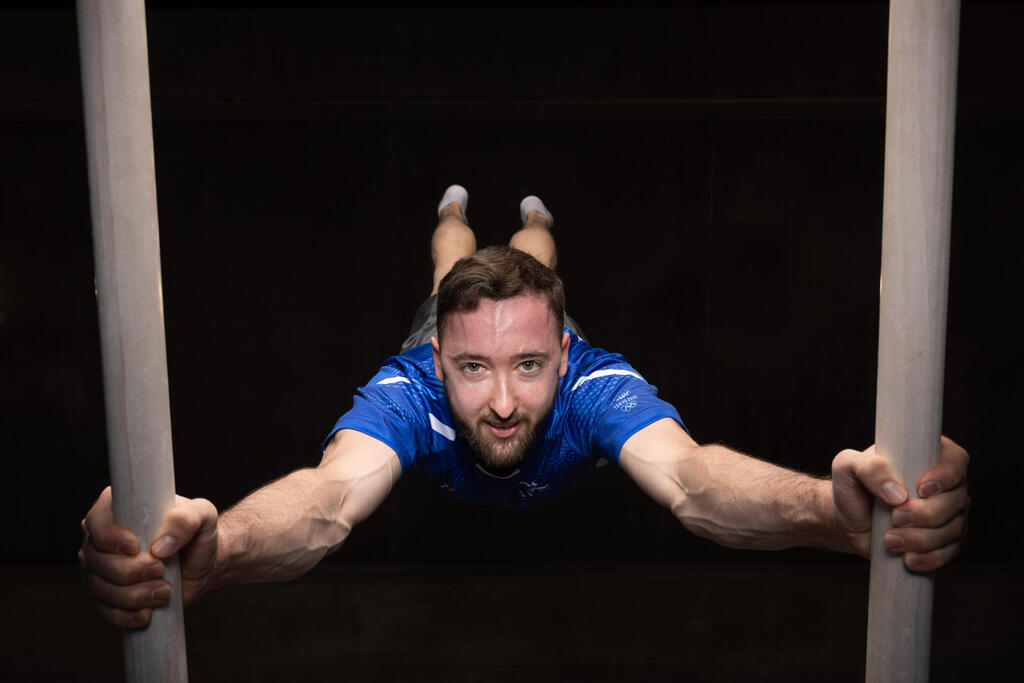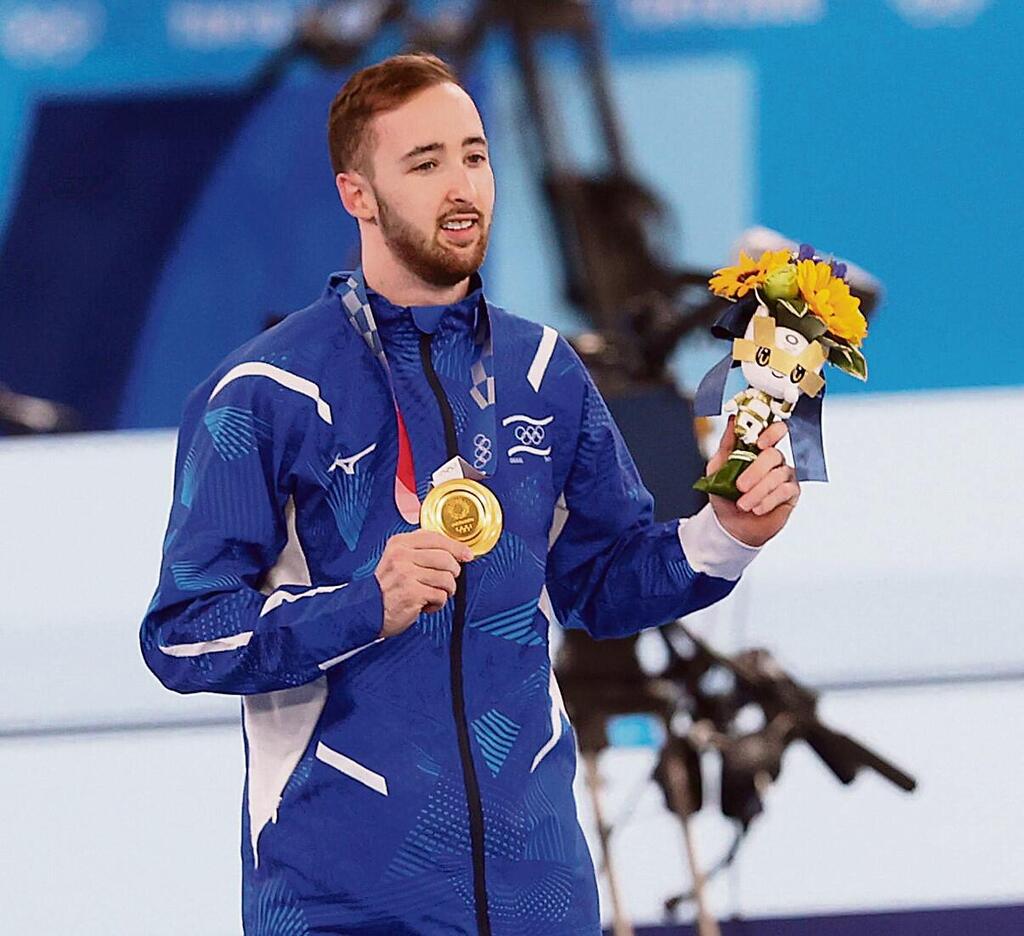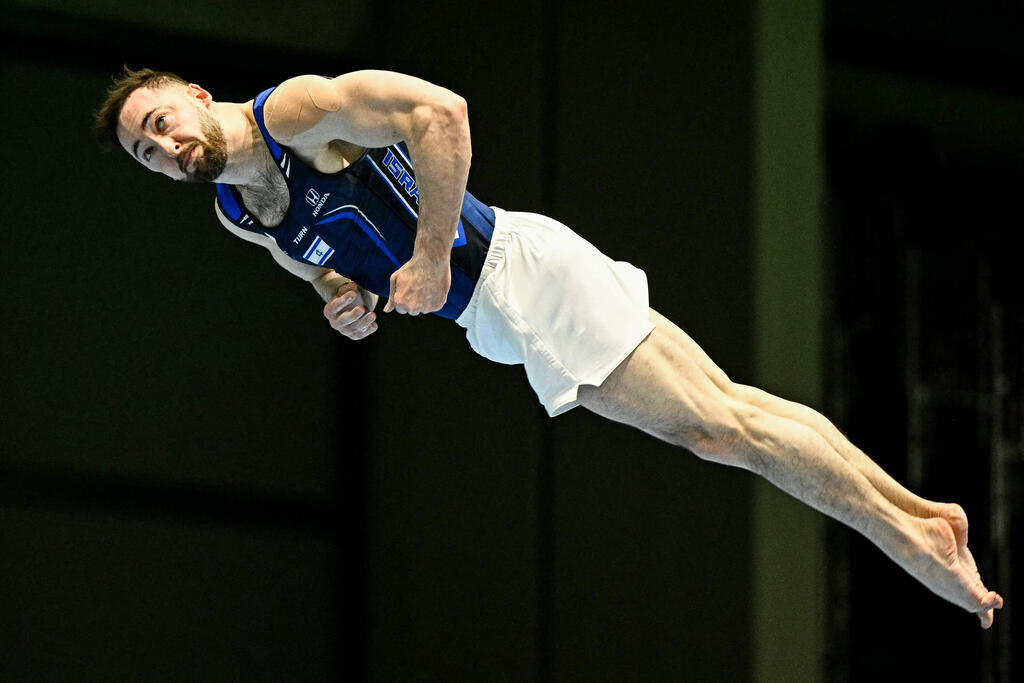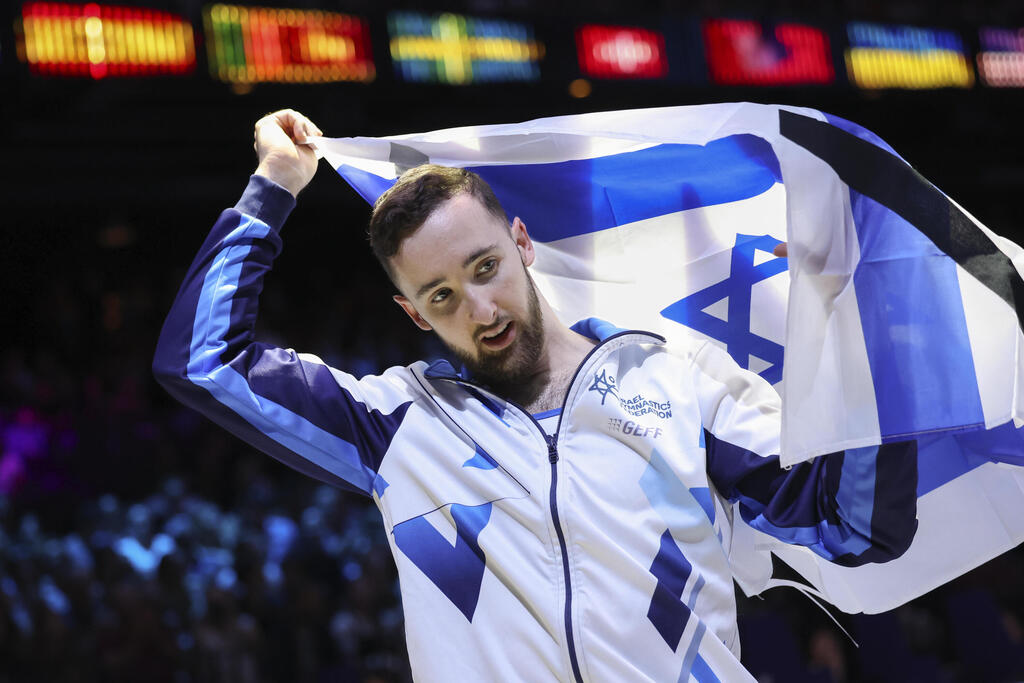Getting your Trinity Audio player ready...
"The most important resource for me during the three years of Olympic preparations was time – which is why I immediately went back to training after winning the medal in Tokyo. No celebrations, no social media distractions. These are not things I want to waste energy on. I have a very structured daily routine. I live in my own bubble, together with my coach Sergei Vaisburg. Every minute is critical. Therefore, I focus only on training and recovery. You won’t see me at launches or events. It’s just me and the mat. Every training session helps with precision, to avoid making mistakes. It’s all about the smallest of movements or falls."
If you were to encounter Artem Dolgopyat on the street, most of you probably wouldn't recognize him. You wouldn’t know that the modest and introverted guy who just walked past you is one of the greatest athletes our country has ever produced. Honestly, it’s a bit unfair towards someone who gave the country an Olympic gold medal just three years ago in Tokyo, and in apparatus gymnastics – one of the core sports of the games. But this is also Dolgopyat's charm: he is devoid of affectations, not someone who chases after fame and recognition. He is a pure athlete, a true professional dedicating the best years of his life to being number one in his field.
If we wrote "one of the greatest," then by the end of the first week of the Paris Olympics, we might be able to remove the small caveat and officially declare him "the greatest of all." This will happen if he manages to become the first Israeli gold medalist to defend the most prestigious title (Gal Fridman, who won gold in Athens, lost to Shahar Tzuberi in the battle for the ticket to the next Olympics in Beijing; Linoy Ashram retired after Tokyo).
Dolgopyat would need a wardrobe to house all the medals he has collected in his career, and we would fill an entire page listing them all – so we’ll just mention that he is also a world champion and a two-time European champion. The boy who immigrated from Ukraine at the age of 12 has shattered every conceivable glass ceiling, raising the bar year after year and achieving feats no other Israeli athlete has done before him.
His physique – 5’3” and 128 lbs. of incredible flexibility and explosive strength – gives no hint of him being a title-winning sports monster. A ground missile with built-in technical prowess, he admits that pressure is his biggest enemy, yet in big moments, he sees only one thing ahead – the podium. And his stability is not only in his solid legs but also in maintaining his consistent position at the world’s top.
Dolgopyat (27) recently moved out of his parents' home in Rishon LeZion and now lives in Netanya with his fiancée Masha, close to the training facility at the Wingate Institute. This coming Saturday, thousands of kilometers away, he will stand at the starting line for the moment he has prepared for over the past three years, aware of the high expectations – the possibility of doing something historic and extraordinary. "It can only make me nervous," he says with a shy smile at the beginning of the interview, then quickly reassures: "It will be fine; I'm coming with an open mind to do my best." Yes, we are already familiar with this "best."
The modesty that might sound like a lack of confidence never leaves him and appears at every stage of the conversation. "Being an Olympic champion is an immense satisfaction, but I didn't believe it would happen. I really wanted a medal, but I never dared dreaming of gold," he shares. "One of the important decisions I made after the Tokyo Olympics was that no matter what, I would not retire. A few days later, I was already back in the gym to train."
On one hand, you talk about pressure; on the other hand, in the moment of truth, it seems like ice runs through your veins. You come as the reigning Olympic and world champion – the expectations are no less than another gold.
"I'm someone who always feels pressure, very strong pressure even, so I prefer to disconnect as much as possible, focus on my training, my competitions, succeed for myself and not think about what others expect of me. Of course, I feel the pressure everywhere. I'm here to do the best I can for myself and for the country. I understand the importance of sporting achievements at this time. I've also learned to try to treat it as just another competition, to think like in any competition. To make the best preparations. It reduces the pressure. Of course, the Olympics are the cherry on top, but I prepare myself in a certain way. A year before Tokyo, my dad sent me a video showing a coach trying to calm his trainee at the Olympics, telling her: 'Don't stress, it's the same competition as always, with the same competitors and the same judges, only the name is big.’ That's the idea that guides me."
On Saturday, the day after the opening ceremony, you begin the qualifiers – then you have to wait a week for the final if you make it. It's not simple, mentally and physically. What did you learn from the similar experience in Tokyo?
"In Tokyo, there was no audience; in Paris, there will be – and a lot of it. But I’ve already learned to block out the noise and not hear what’s happening around me. I only listen to my steps and focus on myself. I learned how to prepare. You’re in the Olympic village, all tense and ready. This time, I hope I’ll be less stressed because you already know that pressure is significant for me, and you know how it is in gymnastics – a small lapse in concentration, one wrong step, and it’s over. It's tough to wait a whole week. You need to find nutritional solutions and training. You don’t want to tire your legs too much with exercises or suffer from pain."
In the last European Championship in Italy, you finished second. Were you disappointed?
"I’m not entirely satisfied with the silver medal at the European Championship. I didn’t perform my best routine, but it was a really tough competition. I competed in the all-around, and two days later, I had the floor final and then the all-around final with five more apparatus, and my leg didn’t feel the best. But I was really close. I dedicated this medal to the hostages, the soldiers, and all the people of Israel, which is very important to me. My goal was to increase the difficulty level of my routine, but the leg injury bothered me. Now I’ll try to focus on the best execution. I had to learn new connections. You always need to adapt to changing requirements and styles."
How are you perceived among gymnasts worldwide?
"From the very beginning, I didn’t like the Olympic champion status. I went to my first competition in Germany and had a fall there. Very quickly, it made me realize that no matter what I did in Tokyo, it doesn’t matter moving forward; I need to be ready for Paris. I prefer to stay in my corner, get on the mat, do the best job, and that’s it. What happened in Tokyo is behind me. Now I judge myself only by what will happen in Paris. I didn’t leave my studies for nothing to focus on gymnastics. It was a decision I made wholeheartedly, and my goal was to make my parents as happy as possible with my achievements."
Describe your preparation for the games this time.
"A lot of pain in my neck and Achilles tendon due to a bone that has grown in the area. Gymnasts are naturally prone to injuries. I’m actually not someone whose career has been accompanied by injuries, but it’s waking up every day with crazy pain, every single day, and still, it’s all worth it when you stand on the podium."
Artem Dolgopyat’s recent victory at the World Championships in Antwerp is forever connected to the traumatic date of October 7 – the same Saturday morning when Hamas launched an attack on Israeli border communities, resulting in a massacre. Alerts from the Home Front Command woke Dolgopyat at 5:30 in the morning. Initially, the Olympic champion thought it was just routine rocket fire from Gaza, a part of Israeli reality. But soon, the first images of the horrors began to flood in, and he started to grasp the scale of the disaster. Due to the situation, he was informed he wouldn't be able to fly back to Israel on his scheduled connecting flight through Turkey and was instructed to stay in his hotel.
After recovering from the initial shock, Dolgopyat turned off his phone, put on headphones, disconnected from everything, and decided that nothing would stop him from wrapping himself in the Israeli flag and bringing some pride and solace to his country on this difficult day. "Before I went down for breakfast at the hotel, I started seeing videos of terrorists shooting at police cars in Sderot. I was in shock," he recalls with a choked voice. "I immediately contacted my family. My mom lives in Rishon LeZion, and they were in the safe room because of the sirens. I felt depressed and anxious. I told myself I had to detach from everything and tried not to think about it; otherwise, I wouldn’t be able to compete in the final."
Were you able to detach?
"I arrived at the arena with headphones on and was in my own world. It was hard; it wasn’t easy to disconnect. I put myself in a competitive mindset. In the end, I performed well, though not perfectly. Thankfully, the other gymnasts also received low scores due to strict judging. I didn’t watch the other routines, as that would have increased my stress. Only after the last routine, by a Japanese gymnast, did I realize I was the world champion. It was one of my greatest sporting days, but it happened on the hardest day for my country. During the playing of 'Hatikvah,' tears streamed down my face. It should have been one of the happiest days of my career, but my heart and mind were in Israel.
"Before I even stood on the podium, I opened my phone and read very emotional messages from people, telling me that on this terrible day, I was their beacon of light. They also sent me congratulatory videos that really warmed my heart. It’s a feeling I can’t explain, the worst feeling possible. I saw videos of a grandmother being kidnapped from her home and heard that another grandmother was murdered and it was posted on Facebook. It weighed heavily on my heart. Those images stayed in my mind and wouldn’t leave."
As an Israeli icon, how do you handle the hostile discourse on social media?
"There are comments on my Instagram posts from people writing 'Free Palestine' and things like that, putting up their Palestinian flag with a heart. Some gymnasts post support for Palestinians. I don’t respond to or engage with these people; I block them immediately. I certainly don’t talk to them when I meet them. I’m angry about the situation, about these people who don’t even understand what they’re writing. We have a team member who asked one of the gymnasts why he did such a thing, and he replied that he’s Muslim."
Dolgopyat put his World Championship medal up for auction to help the victims of the Hamas massacre, setting a starting price of $100,000, but it ultimately didn’t go through. "I knew I was parting with a medal that is one of the highlights of my career for a very important cause, with a lot of emotion," he says. "Of course, it’s a precious medal to me, but the goal was to give back to the country that has given me so much."
Who are your significant rivals in the battle for gold in Paris?
"There isn’t anyone specific I can mention. I come to the competition, and I am my own rival. I don’t think about who’s coming or not coming; I don’t like these thoughts that can get into your head. In gymnastics, one small step can put you out of the final. Even fatigue can decide it, so I’m mainly my own rival."
"Regardless of the outcome in Paris, I'm continuing to Los Angeles 2028. I’ll be 31, and that’s perfectly fine. It also takes the pressure off since this won’t be my last Olympics."
You said one of the important decisions you made that helped with your preparations was to continue after Paris. Is Los Angeles 2028 in your plans?
"The decision was made a long time ago, regardless of my result in Paris – I’m continuing to Los Angeles. I’ll be 31, and that’s perfectly fine. I’ll have four years to prepare, and it also takes the pressure off knowing this isn’t my last Olympics."
So, this time, will you go straight back to the gymnastics hall in Hadar Yosef, or will you take some time off?
"My fiancée has already informed me that after the Olympics, we’re getting married, that’s an order, and I really want that. This time, we’ll get married and go on a honeymoon; it’s very important to me."





